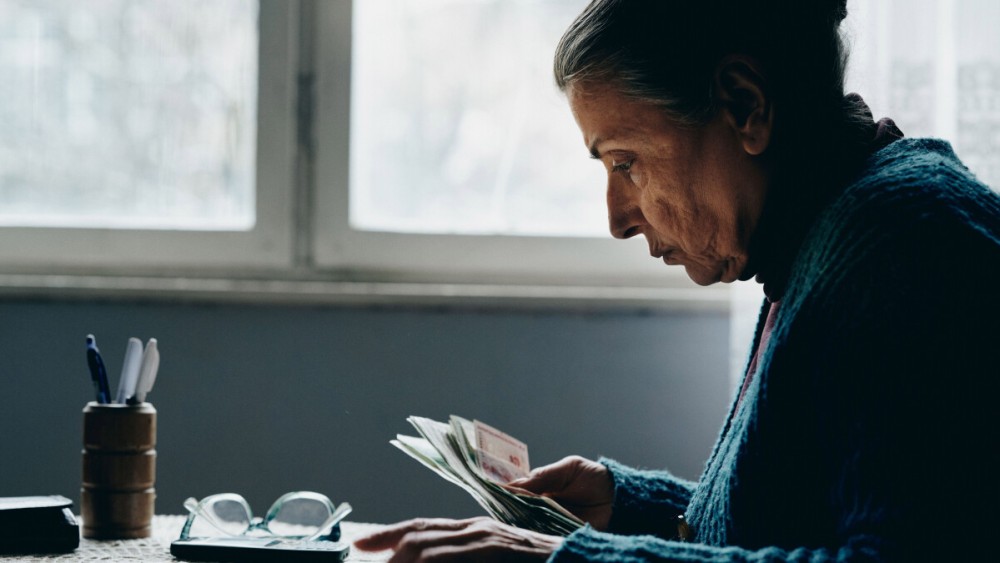‘Blaga’s Lessons’ Review: A Riveting Social Thriller From Bulgaria
In one fell swoop, 70-year-old widow Blaga Naumova goes from being cash-strapped to cash-stripped. All her life, she’s carefully pinched pennies to accumulate a modest cushion of life savings that she’s nonetheless never been sensible enough to put in the bank; decades of scrimping amount to naught when, in a moment of terrorized madness, she caves to the threats of a phone scammer and quite literally throws her very small fortune out the window. How could you be so stupid, everyone asks her, and many in the audience are likely to echo them. But Stephan Komandarev’s damning, despairing, riveting thriller “Blaga’s Lessons” sees things another way: In a post-communist Bulgaria where women like Blaga are legally bled dry by cowboys and corrupt institutions on all sides, how is she supposed to see the difference?
Premiering in the main competition at Karlovy Vary, this is tense, tough-minded fare that isn’t afraid to test the bounds of realism for the sake of a good story, but nonetheless feels authentically rooted in an ailing, neglected strand of Bulgarian society. Like much of Komandarev’s work, it marries a stern social conscience to a crowdpleasing flair for genre — at least until a bluntly provocative denouement that will divide viewers along “what would you do” lines.
Three decades into a career split equally between documentaries and fiction features, Komandarev has twice been submitted for the international feature Oscar (cracking the shortlist with 2008’s “The World is Big and Salvation Lurks Around the Corner”) and made the Cannes official selection with 2017’s “Directions,” but has never quite broken through on the global arthouse circuit. “Blaga’s Lessons” feels like the film that could finally change that, with a more focused approach than composite ensemble pieces like “Directions” and his 2019 cop drama “Rounds.” This time, Komandarev builds a work around a single performance, and a tremendous one at that: Returning to film acting after a 30-year absence, veteran Bulgarian thesp Eli Skorcheva shows nary a hint of rust in a demanding, never-off-screen part that feels at least half-written by the storied planes and cracks of her remarkable face.
At 70, retired schoolteacher Blaga is largely alone in the world, and stoically accepting of that status. We meet her days after the death of her husband, a former police officer, and it’s clear she hasn’t had many friends or well-wishers at her concrete-block apartment in the tired northern town of Shumen. Her son is a gig-economy driver in the U.S., present only via occasional, ill-tempered FaceTime calls; he sends some money home to add to her meager pension, which she further supplements by giving Bulgarian lessons to immigrants seeking citizenship. But all that isn’t quite enough to lock down the gravesite she wants for her husband, dangled before her by a plainly manipulative cemetery salesman who accepts her hefty deposit but refuses to guarantee her the plot, hiking the price up all the while.
He’s a crook, but Blaga is accustomed to crooks, which may be why she keeps all her money in cash, at home: In lean strokes, Komandarev lays out the inadequacy of social care and protection for senior citizens in Bulgaria. Her already precarious financial situation plunges when she falls prey to the aforementioned scam — a purported high-stakes police operation that plays out over one extended, stomach-knotting scene in Blaga’s apartment, volleying her between equally aggressive, instructive calls on her landline and cellphone. There’s a ghoulish streak of comedy to this, right up until the point where she tosses the cash and a sick, stricken glimmer of realization crosses her face. The cops, all too familiar with such incidents, are only nominally sympathetic; local tabloid reporters, reveling in her misfortune, even less so.
Desperation drives Blaga to quick-loan sharks, one of them a resentful former student of hers. When that doesn’t pan out, she swallows her pride and principles and, using information gleaned from the police, takes a job as a mule for the very scammers who got her — a doozy of a narrative leap made tautly credible by Komandarev and Simeon Ventsislavov’s methodical scripting and the anxiously determined intensity of Skorcheva’s performance. Blaga’s lurch into crime steers the film further into breathless suspense territory, assisted by the subtly ticking rhythms of Nina Altaparmakova’s editing and Vesselin Hristov’s sparsely lit, charcoal-hued lensing.
Yet as effective as it is on this front, “Blaga’s Lessons” never feels like a mere tension exercise: Komandarev keeps audiences mindful of, and angry at, the systems and circumstances driving this genre pivot. It surely cannot end well, but Skorcheva gives Blaga enough icy, ruthless pragmatism beneath her quivery body language and hard, creased, eventually bruised expressions of worry to make us wonder if she might — and queasily root for her as she assists in ruining the lives of others until, at a certain point, the film challenges us to keep doing so. Whatever the fate of Blaga’s soul, however, at least she knows where she’ll be buried.

